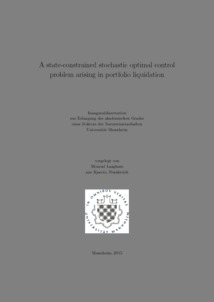|
A state-constrained stochastic optimal control problem arising in portfolio liquidation
Lazgham, Mourad
![[img]](https://madoc.bib.uni-mannheim.de/style/images/fileicons/application_pdf.png)  Vorschau |
|
PDF
Dissertation_Mourad_Lazgham_October_2015.pdf
- Veröffentlichte Version
Download (1MB)
|
|
URL:
|
https://ub-madoc.bib.uni-mannheim.de/39698
|
|
URN:
|
urn:nbn:de:bsz:180-madoc-396989
|
|
Dokumenttyp:
|
Dissertation
|
|
Erscheinungsjahr:
|
2015
|
|
Ort der Veröffentlichung:
|
Mannheim
|
|
Hochschule:
|
Universität Mannheim
|
|
Gutachter:
|
Schied, Alexander
|
|
Datum der mündl. Prüfung:
|
28 Juli 2015
|
|
Sprache der Veröffentlichung:
|
Englisch
|
|
Einrichtung:
|
Fakultät für Wirtschaftsinformatik und Wirtschaftsmathematik > Wirtschaftsmathematik I (Schied)
|
|
Fachgebiet:
|
510 Mathematik
|
|
Fachklassifikation:
|
|
|
Normierte Schlagwörter (SWD):
|
Hamilton-Jacobi-Differentialgleichung , Erwarteter Nutzen , Optimierungsproblem , Viskositätslösung , Optimale Kontrolle
|
|
Freie Schlagwörter (Deutsch):
|
Erwartungsnutzenmaximierung mit Zustandsbeschränkungen , Wertfunktion , Hamilton-Jacobi-Bellmann Gleichung mit Singularität , Viskositätslösung
|
|
Freie Schlagwörter (Englisch):
|
Expected utility maximization problem under finite fuel constraint , value function , Hamiltion-Jacobi-Bellmann equation with singularity , viscosity solution
|
|
Abstract:
|
We consider a stochastic optimal control problem originating from a classical portfolio liquidation problem, which is related to an expected utility maximization problem under finite fuel constraint. This has been extensively studied in the existing literature for the case where the utility function is assumed to be an exponential function (see, e.g., Schied et al. (2010)). The purpose of this work is to investigate more general utility functions with exponential growth.
As a first main result, we can establish the existence and uniqueness of optimal strategies, under rather mild model assumptions. This is a core result, which will then allow us to derive regularity properties of the corresponding value function. In particular, we will establish the continuity and partial differentiability of the value function for the underlying maximization problem.
Second, we prove a Bellman principle for the underlying optimization problem. The proof of this optimality principle is facilitated in our case by the continuity property of the value function. With this at hand, we will show that the control problem considered is closely related to the solution of a nonlinear parabolic degenerated Hamilton-Jacobi-Bellman (HJB) equation with singularity. In particular, a verification theorem is proved.
Third, the Bellman principle turns out to be a crucial tool for char- acterizing our value function as the unique viscosity solution of an HJB equation. A comparison principle is derived, where, contrarily to mainstream results, the proof does not involve the use of the (classical) Crandall-Ishii lemma.
Numerical results and simulations conclude our work. For instance, we show that our value function can be considered as the unique viscosity solution of an HJB equation with removed singularity in the initial condition. This enables us then to implement converging numerical schemes, based on the monotone schemes method of Barles and Souganidis (1991). Matlab visualizations are presented in the last section of this thesis.
|
|
Übersetzter Titel:
|
Optimale Steuerung mit Zustandsbeschränkungen in der Portfolioliquidierung
(Deutsch)
|
|
Übersetzung des Abstracts:
|
Wir betrachten ein stochastiches Kontrollproblem, das aus einem klassischen Portfolioliquidierungsproblem abgeleitet wird, und das mit einer Erwartungsnutzenmaximierung mit ”fuel constraint” zusammenhängt. Das wurde ausführlich fÜr den Fall, in dem die Nutzenfunktion als die Exponentialfunktion angenommen wird, in der bisherigen Literatur untersucht (siehe z.B. Schied et al. (2010)). Das Ziel dieser Arbeit besteht darin, diesen Zusammenhang für allgemeine Nutzenfunktionen mit ex- ponentiellem Wachstum zu analysieren.
Als ein erstes Hauptresultat weisen wir die Existenz und Eindeutigkeit optimaler Strategien unter relativ milden Modellannahmen nach. Dies ist ein Kernresultat, das es uns ermöglichen wird, analytische Eigenschaften der Wertfunktion herzuleiten. Insbesondere wird die Stetigkeit und partielle Differenzierbarkeit der Wertfunktion hergeleitet.
Zweitens zeigen wir, dass für das zugrunde liegende Optimierungsproblem ein Bellmannsches Prinzip gilt. Der Beweis dieses Optimalitätsprinzips wird durch die Stetigkeit der Wertfunktion erleichtert. Somit können wir dann zeigen, dass ein enger Zusammenhang zwischen unserem Kontrollproblem und einer nichtlinearen parabolischen degenerierten Hamilton-Jacobi-Bellmann Gleichung (HJB) mit Singularität besteht. Insbesondere beweisen wir einen Verifikationssatz.
Drittens benutzen wir das Bellmannsche Prinzip, um die Wertfunktion unseres Kontrollproblems als die eindeutige Viskositätslösung einer HJB-Gleichung mit Singularität zu charakterisieren. Wir leiten ein Vergleichsprinzip her, wobei das (klassische) Lemma von Crandall und Ishii nicht in dem Beweis verwendet wird.
Zum Abschluss stellen wir die numerischen Ergebnisse dar. Es wird unter anderem gezeigt, dass unsere Wertfunktion als die eindeutige Viskositätslösung einer HJB-Gleichung ohne Singularität in der Anfangswertbedingung dargestellt werden kann. Dies erlaubt uns dann, konvergente numerische Verfahren zu implementieren. Matlabmodellierungen runden die Arbeit ab.
(Deutsch)
|
 | Dieser Eintrag ist Teil der Universitätsbibliographie. |
 | Das Dokument wird vom Publikationsserver der Universitätsbibliothek Mannheim bereitgestellt. |
 Suche Autoren in Suche Autoren in
Sie haben einen Fehler gefunden? Teilen Sie uns Ihren Korrekturwunsch bitte hier mit: E-Mail
Actions (login required)
 |
Eintrag anzeigen |
|
